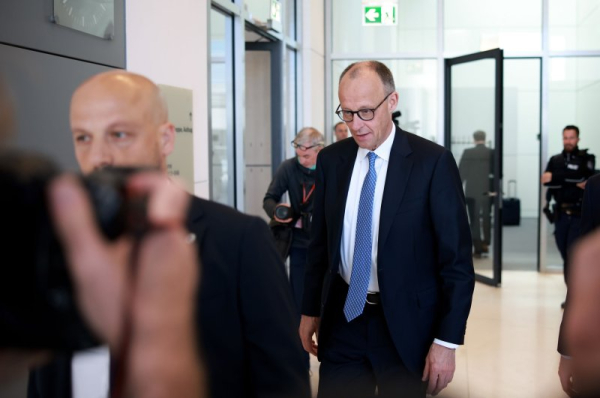

CDU leader Friedrich Merz leaves a parliamentary group meeting at the Bundestag in Berlin on Tuesday after failing in his bid to be elected chancellor in the first round of ballot of MPs. The 69-year-old was expected to be a shoe-in to replace Olaf Scholz who was ousted in a no-confidence vote in December. Photo by Clemens Bilan/EPA-EFE
The leader of Germany’s Christian Democrat-Social Democratic coalition, Friedrich Merz, suffered a shock defeat Tuesday in his bid to become chancellor after failing to secure a majority in a vote in the Bundestag in Berlin.
Merz, whose election was expected to be formailty a day after the two centrist parties formally entered into a coalition, won 310 votes — six short of the 316 he needed to be chancellor in the wake of a snap national election in February in which no party secured an overall majority.
“After the coalition agreement between CDU, CSU and SPD was signed yesterday, Friedrich Merz is officially elected federal chancellor today,” the CDU declared in a post on X early Tuesday, only to have to walk it back hours later.
The CDU and SPD have a comfortable margin with 328 seats out of 630 between them but Merz was derailed in the first round vote, the BBC said, after 18 MPs who were expected to back him, decided otherwise.
SDP co-leader, Lars Klingbeil, who was to be vice chancellor in the new coalition government, denied SDP MPs were behind Merz’ defeat, with the implication that Merz faced a revolt within the ranks of his own party.
Engagements penned in for Merz in Paris and Warsaw on Wednesday, leading World War II commemorations back home on Thursday, and in Brussels on Friday were thrown into doubt.
It marks the first time any leader has fallen short in the first round in more than seven decades and will likely be damaging for Merz’ ambition to draw a line under the faliures of the previous government of Olaf Scholz, which was brought down by a no-confidence vote in December.
There was confusion as to what happens next with Bundestag President Julia Klockner saying she would work to bring forward a revote from Friday to Wednesday, but CDU General Secretary Carsten Linnemann argued that was too slow.
“Europe needs a strong Germany, that’s why we can’t wait for days,” said Linnemann.
Klockner was reported to have requested the far-right Alternative for Germany and the Greens — the second and fourth largest parties which hold a combined 236 seats — attend a second round vote Wednesday but the expedited vote can only take place with the backing of all the Bundestag parties.
Bundestag rules permit other candidates to run for chancellor and there is no restriction on how many times a vote can be repeated, subject to a 14-day time limit after which a leader can be elected with a simple majority.
The AfD called for a general election, with joint leader Alice Weidel writing in a post on X that the debacle demonstrated “the weak foundation on which the small coalition between the CDU/CSU and the SPD, which was voted out by the voters, is built.”